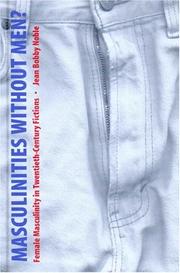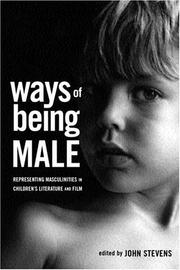| Listing 1 - 3 of 3 |
Sort by
|

ISBN: 0774809973 9780774809962 0774809965 9780774809979 9780774851893 0774851899 128313120X 9781283131209 0774809965 9786613131201 6613131202 Year: 2004 Publisher: Vancouver, B.C. UBC Press
Abstract | Keywords | Export | Availability | Bookmark
 Loading...
Loading...Choose an application
- Reference Manager
- EndNote
- RefWorks (Direct export to RefWorks)
Conventional ideas about gender and sexuality dictate that people born with male bodies naturally possess both a man's identity and a man's right to authority. Recent scholarship in the field of gender studies, however, exposes the complex political technologies that construct gender as a supposedly unchanging biological essence with self-evident links to physicality, identity, and power. In Masculinities without Men? Jean Bobby Noble explores how the construction of gender was thrown into crisis during the twentieth century, resulting in a permanent rupture in the sex/gender system, and how masculinity became an unstable category, altered across time, region, social class, and ethnicity. This groundbreaking study maps historical similarities in fictional, cultural, and representational practices between the periods of modernism and postmodernism. Noble examines nineteenth-century sexology, drama, and trial transcripts, and late twentieth-century counter-cultural fiction, popular film and documentaries, and theoretical texts. Among the works analyzed closely are texts that have been the focus of lesbian, queer, and feminist theory: Radclyffe Hall's The Well of Loneliness, Leslie Feinberg's Stone Butch Blues, and the film Boys Don't Cry. These, as Noble illustrates, make use of similar types of narratives, structures, and thematic techniques to articulate female masculinity. Also included is an exploration of Rose Tremain's Sacred Country, which has never before been studied within this context. Through a critical examination of these texts, Noble demonstrates that trans-gendered and trans-sexual masculinity began to emerge as a unique category in late twentieth-century fiction, distinct from lesbian or female masculinity. Of interest to scholars and students with an interest in sexuality and gender studies, Masculinities without Men? also makes a vital contribution to literary criticism, as well as to cultural and film studies.
Gender identity in literature. --- Lesbianism in literature. --- Masculinity in literature. --- Fiction --- Women in motion pictures. --- Motion pictures --- Masculinity (Psychology) in literature --- History and criticism. --- Gender --- Homosexuality --- Identity --- Female homosexuality --- Literature --- Masculinity --- Theory
Book
ISBN: 1496217934 1496217918 9781496217912 9781496217097 1496217098 9781496229052 9781496217936 Year: 2019 Publisher: Lincoln University of Nebraska Press
Abstract | Keywords | Export | Availability | Bookmark
 Loading...
Loading...Choose an application
- Reference Manager
- EndNote
- RefWorks (Direct export to RefWorks)
"Salvific Manhood reimagines the complexities of human brotherhood and masculinity by examining distinct iterations of male intimacy within all of James Baldwin's novels"--
Intimacy (Psychology) in literature. --- Brotherliness in literature. --- Masculinity in literature. --- Men in literature. --- Masculinity (Psychology) in literature --- Baldwin, James, --- Criticism and interpretation. --- Literature --- Baldwin, James --- United States --- United States of America --- Masculinity --- Book

ISBN: 0415938619 0415995159 9780415938617 9780415995153 0203953487 1135363846 9781135363840 9780203953488 9781135363918 9781135363987 1306048532 1135363919 Year: 2008 Volume: 19 Publisher: New York Routledge
Abstract | Keywords | Export | Availability | Bookmark
 Loading...
Loading...Choose an application
- Reference Manager
- EndNote
- RefWorks (Direct export to RefWorks)
First Published in 2002. Routledge is an imprint of Taylor & Francis, an informa company.
Children's literature --- Children --- Masculinity in literature --- Young adult literature --- Young adults --- Masculinity (Psychology) in literature --- Books and reading for children --- Reading interests of children --- History and criticism --- Books and reading --- Masculinity in literature. --- History and criticism. --- Books and reading. --- Developmental psychology --- Sociology of culture --- Sociology of the family. Sociology of sexuality --- Drawing --- Film --- Children's literature. Juvenile literature --- Thematology --- Psychological study of literature --- gender --- jeugdliteratuur --- Movies --- Gender --- Homosexuality --- Images of men --- Masculinity --- Stereotypes --- Cross-dressing --- Book
| Listing 1 - 3 of 3 |
Sort by
|

 Search
Search Feedback
Feedback About UniCat
About UniCat  Help
Help News
News